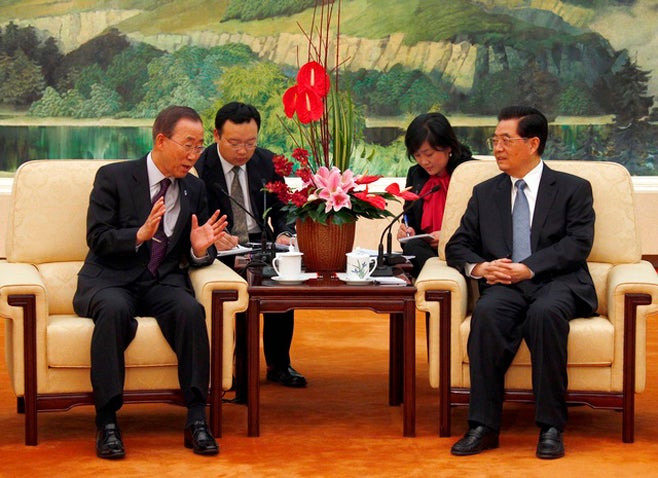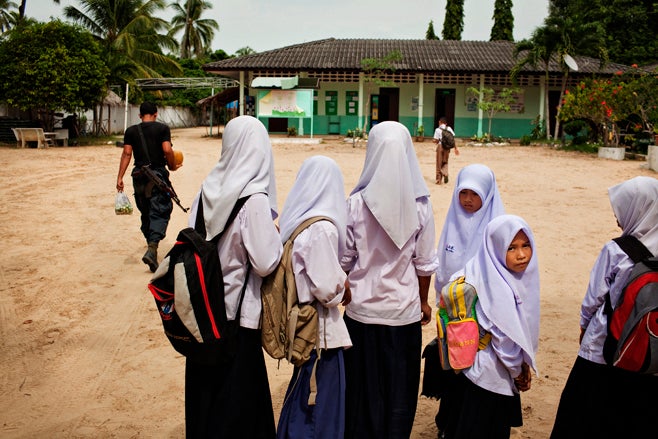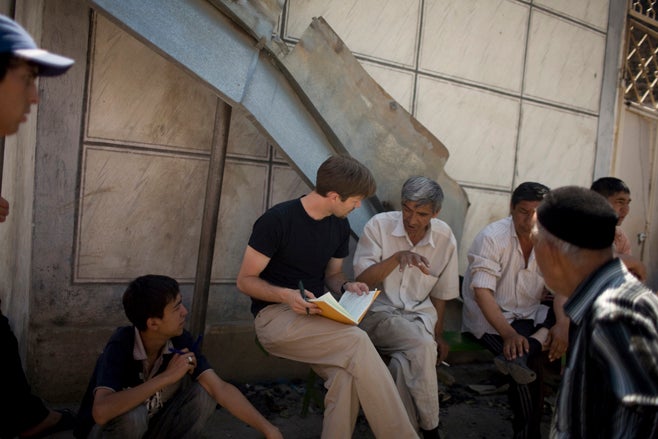Chilean military courts that fall short of international standards of independence and impartiality continue to investigate and try police accused of human rights abuses. Counterterrorism legislation has been used inappropriately to deal with common crimes committed by indigenous protesters. Legislation enacted in 2010 only partially corrected these problems.
Judges continue to convict former military personnel accused of committing grave human rights violations during the military dictatorship (1973-1990). However, final sentences are often unacceptably lenient given the seriousness of the crimes. Overcrowding and inhumane conditions in many Chilean prisons remains a serious problem.
Military Jurisdiction
Beginning in 2000, Chile has overhauled its criminal justice procedure and reinforced due process guarantees, however, until 2010, military courts continued to exercise jurisdiction over civilians accused of acts of violence against Carabineros (uniformed police), which is part of the armed forces. Military courts still hold jurisdiction over crimes committed by Carabineros against civilians, such as use of excessive force, torture, and ill-treatment.
In a 2005 ruling in the Palamara case, the Inter-American Court of Human Rights ordered Chile to ensure that military courts no longer exercise jurisdiction over civilians. Subsequent court decisions have held that members of the armed forces accused of humans rights violations should also be tried under civilian jurisdiction.
Legislation approved by Congress in September 2010 finally complied with Chile's obligation to ensure that civilian courts try civilians in all cases. However, it did not transfer to civilian jurisdiction cases of abuse by police officers against civilians, thereby failing to meet Chile's obligations under international law to ensure that law enforcement officials accused of human rights abuses are tried by independent and impartial courts.
Police Abuses
In repeated incidents, carabineros have used excessive force during operations in indigenous Mapuche communities in the Araucanía region. Abuses typically occur when police try to control Mapuche protests and prevent land occupations, or when they enter communities to pursue activists suspected of crimes allegedly committed during land disputes with farmers and logging companies.
Since 2002, police have been responsible for the deaths of at least three Mapuches. As noted, such cases are investigated by military courts that do not meet international standards of independence and impartiality; sentences have either resulted in acquittals or been extremely lenient. In August 2010, for example, Corte Marcial (the military appeals court) placed on probation for three years a police corporal convicted of using excessive force by shooting a Mapuche activist, Matías Catrileo, in the back with a submachine gun. Three military judges on active service have a majority on the panel, which also includes two civilian appellate judges. The same court acquitted a policeman accused of shooting a young Mapuche, Alex Lemun, in 2002. In July 2010 it ordered charges dropped against four policeman accused of beating Carlos Curinao, the son of a Mapuche community leader, while he lay prostrate on the ground.
Counterterrorism Laws
Since 2004 Human Rights Watch has expressed concern about inappropriate use of counterterrorism legislation to deal with common crimes, such as arson, committed by indigenous Mapuche activists. Under Chile's counterterrorism law, crimes against property, such as burning homesteads, woods, or crops; or damaging vehicles or machinery, are considered terrorist crimes if judges believe they are intended to spread fear among the population. Defendants under the law have restricted due process rights and face much higher sentences. As of June 2010 more than 50 Mapuches faced terrorism charges and five had been convicted of terrorist crimes.
In October 2010 the government enacted legislation to modify the counterterrorism law in response to a hunger strike by 32 Mapuche prisoners protesting the law's application to their cases, as well as their prosecution by military courts. The reforms of the counterterrorism law strengthened some due process guarantees, such as allowing witnesses whose identity can be concealed by prosecutors to be cross-examined by defense attorneys. The government also announced it would drop all accusations of terrorism against Mapuches currently in the courts, and accuse them only under the ordinary criminal law. However, the inclusion in the law of crimes against property was left unchanged, and public prosecutors continued to apply the law to such crimes.
Confronting Past Abuses
Cases of human rights abuses committed during military rule under investigation by the courts rose from 350 in April 2010 to 452 in June 2010 due to relatives' associations filing new cases. President Sebastian Piñera continues to provide government support for the Human Rights Program attached to the Ministry of the Interior, whose lawyers help relatives of victims pursue their cases before the courts.
As of June 2010, 292 former military personnel and civilian collaborators had been convicted on charges of enforced disappearances, extrajudicial executions, and torture (of whom 210 had the verdict confirmed on final appeal). Sixty-four were serving prison sentences; 490 more were facing charges.
In July 2010 Piñera announced he would exclude prisoners convicted of human rights violations from presidential clemency measures that the Catholic Church had requested to mark the 200th anniversary of Chile's founding as a republic.
In July 2010 the Supreme Court's criminal chamber confirmed the conviction of Augusto Pinochet's secret police chief, Manuel Contreras, and eight other agents for the 1974 car bomb assassination of former army commander Carlos Prats and his wife. The court sentenced Contreras and his associate Pedro Espinoza to 20 years in prison for aggravated homicide and criminal association. The court held these were crimes against humanity, and that Chile is bound under the Geneva Conventions to judge and punish those responsible for such crimes, regardless of the self-amnesty law that Pinochet introduced in 1977.
However, in many cases the Supreme Court has routinely used its discretionary powers to reduce sentences against human rights violators in recognition of the time elapsed since the criminal act. Often the sentence finally imposed is low enough to exempt those convicted from going to prison. This practice raises concerns about Chile's fulfillment of its obligation to hold perpetrators of disappearances accountable by imposing appropriate punishment or sanctions; less than one-third of those convicted were actually serving prison time in August 2010.
Prison Conditions
Chile has yet to take effective measures to relieve severe overcrowding in its prisons, and alleviate conditions that a senior justice official has described as "inhumane."
In Chile's most crowded prisons in 2010, at least two prisoners on average occupied facilities intended for one. Prison conditions include overcrowding; poor sanitation, ventilation, and nutrition; and lack of potable water. Yet despite conditions conducive to ill-health and the spread of infectious disease, access to medical care remains inadequate. According to a report that a government-appointed prison review commission issued in March 2010, the problem stems from delays in the construction of new facilities, the introduction of faster criminal procedures, harsher sentencing policies, and failure to implement effective alternatives to prison. Following visits to facilities across the country in July and August, Minister of Justice Felipe Bulnes said that the problem of overcrowding had been "invisible for a long time," and announced measures to improve conditions.
Reproductive Rights
Chile is one of a handful of countries that prohibits abortion in all circumstances, even in cases of rape or incest, or to save the life or health of a pregnant woman. Despite this, an estimated 60,000 to 200,000 clandestine abortions occur annually, corresponding to between 20 and 40 percent of all pregnancies. The lack of precise statistics on the prevalence of abortion speaks to the highly stigmatized and clandestine nature of the practice. Chile also has one of the highest teenage pregnancy rates in the world, with over 15 percent of all births corresponding to adolescent mothers. There was continued controversy in 2010 over the distribution of modern contraceptive methods. For example, the main health authority of Coquimbo region withdrew the authority of midwives to distribute contraception, contravening national norms. Many women, especially in rural or less accessible areas, lose real access when only medical doctors can distribute contraception.
Key International Actors
United Nations experts have repeatedly criticized the use of counterterrorism legislation against Mapuche activists, including the Committee on the Elimination of Racial Discrimination and the special rapporteur on the situation of human rights and fundamental freedoms of indigenous peoples.
In September the Inter-American Commission on Human Rights filed a case with the Inter-American Court on Human Rights accusing Chile of discriminating against Karen Atala, a judge who is an open lesbian, by depriving her of custody of her children because of her sexual orientation. The Supreme Court refused to participate in a panel formed by the Ministry of Foreign Affairs to debate ways of implementing the commission's recommendations, arguing the final court decision was not subject to discussion. The Inter-American Court will decide for the first time whether such discrimination violates the American Convention on Human Rights.



